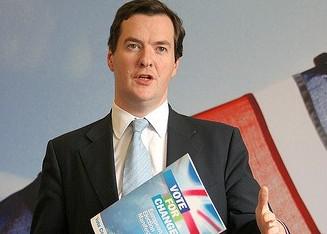 Chancellor of the Exchequer George Osborne. Photo credit: altogetherfool
Chancellor of the Exchequer George Osborne. Photo credit: altogetherfool
The background
The Office National Statistics’s first estimate of GDP in Q2 of 2012 shows a 0.7 percent fall on the first quarter of the year. It should be noted that the big drop – bigger than expected – is just a preliminary estimate and subject to revision later.
The latest drop means that GDP has fallen by a total of around 1.4 percent since 2011 Q3 and is now — more than four years after recession hit — still 4.5 percent below where it was in 2008 Q1, noted Jonathan Jones at Coffee House, The Spectator blog. Jones said the “very big drop” is “driven largely” by a big 5.2 percent contraction in the construction sector.
Chancellor of the Exchequer George Osborne attributed the dip to the UK’s “deep-rooted economic problems.”
Figures are a big blow to the coalition
GDP Figures “show the economy needs fundamental reform,” said James Forsyth at Coffee House, The Spectator blog. Forsyth insisted that today’s figures “are far worse than expected. They mean that the economy has now shrunk for three consecutive quarters. The figures have destroyed the optimism created by the fact that employment and tax revenues are rising.” “Politically, these figures are undoubtedly a blow to the coalition,” argued Forsyth, who reminded that Labour “is out trying to pin the blame for the continuing recession on the government’s economic policy.” “The next election is going to turn on which party can make the most convincing case that they can offer that change,” concluded Forsyth.
Osborne’s sleepless nights
Writing at The Staggers, The New Statesman’s rolling politics blog, George Eaton insisted that the GDP figures “will give Osborne sleepless nights.” Eaton acknowledged that the UK has “many long-term problems – an economy too dependent on finance, a lack of long-term investment, and persistently high levels of youth unemployment – but the charge against Osborne is that he has made them worse, not better.” At times of recession, when consumer spending is depressed and businesses are “hoarding cash, the state must act as a spender of last resort and stimulate growth through temporary tax cuts and higher infrastructure spending,” argued Eaton. “Yet it is precisely this option that Osborne has rejected at every turn, dismissing well-intentioned critics as ‘deficit deniers.’ Today’s figures are his reward.” Eaton concluded that the UK’s AAA credit rating is “one of the few emblems of ‘credibility’ the Chancellor has left. Its loss would be a final and possibly terminal blow to his authority.”
Osborne has nowhere to hide
“The ONS does point out that the extra Jubilee bank holiday will have hurt the economy, as will the record rainfall in April and June — but don’t expect Osborne to highlight this, for fear of a repeat of the ridicule he experienced for pointing to snow and the royal wedding in the past,” said Jonathan Jones at Coffee House, The Spectator blog. Osborne “wisely resisted blaming the eurozone, the weather or the Jubilee for the third successive quarter of contraction,” adjudged George Eaton at The Staggers, The New Statesman’s rolling politics blog.
New stagnation
“We’re failing to grow because we haven’t tackled the underlying ills of the British economy,” argued Steven King, HSBC’s chief group economist at The Times (£). “The UK’s economic problem is not so much a return to recession but a complete absence of recovery,” argued King, who said “we are suffering from what might be called ‘the new stagnation.’ Despite massive monetary and fiscal stimulus in earlier years, the UK economy — with so many other Western economies — has failed to take off: too much debt, too little productivity and too much weakness elsewhere in the world.”
More on the economy
- RBS boss Hester turns down massive bonus
- Eurozone debt crisis continues to deepen
- Will David Cameron really legislate on fat cat pay?
- Is the UK economy doomed?

